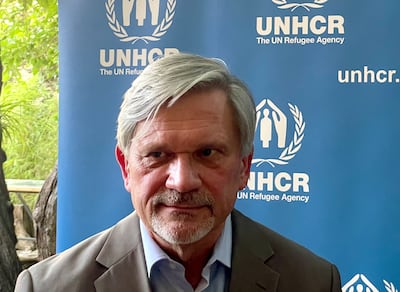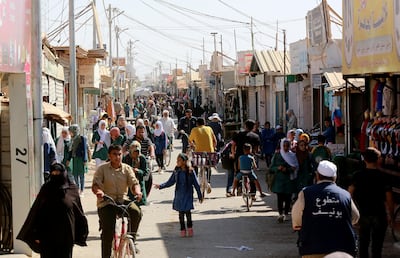Conditions in Syria are not suitable for the return of refugees, 13 years into the country's civil war, a senior UN humanitarian official has told The National.
“Our assessment continues to be right now that the conditions for us to promote returns actively are not yet met,” Dominik Bartsch, head of the United Nations High Commissioner for Refugees operations in Jordan, said in an exclusive interview on Sunday.
The issue of Syrian refugees remains central to politics in both Europe and the Middle East.
Last month, eight European countries – Austria, Cyprus, Czechia, Denmark, Greece, Italy, Malta and Poland – called for the conditions in Syria to be reassessed so that refugees may choose to return voluntarily.
Their statement was a challenge to the larger European powers, led by Germany, who more strongly advocated for refugees in Europe and are less willing to accommodate Syrian President Bashar Al Assad.
Mr Bartsch said the political moves in Europe may create “hope for renewed dialogue” with Damascus, and “may leave a situation where conditions for potential return of refugees in the future will be improved to an extent that we can actively support such a return.”

Europe is home to around one million registered Syrian refugees and asylum seekers, compared with 3.3 million registered in Turkey. Lebanon and Jordan have 1.4 million combined.
European countries, as well as the US, have poured billions of dollars in extra aid to Jordan and Lebanon to help the two cope with the influx of refugees. These financial flows have also paid for infrastructure and public services in the host communities, partly aimed at avoiding another wave of refugees travelling onwards to Europe.
Refugees began fleeing Syria in large numbers in 2011, after the authorities sent tanks to southern Syria and other areas to suppress the peaceful revolt that broke out in March against Mr Al Assad.
The crackdown, by security forces dominated by the minority Alawite sect, contributed to a backlash by members of the country's Sunni majority. By the end of the year, Syria was in civil war.
Many of the refugees in Jordan came from the southern Hauran Plain, the birthplace of the revolt, near the border between the countries. The tribes and clans in the area have relatives in Jordan, with intermarriages and established trade flows.

Over the past two years, Jordan has complained about declines in UN funding for the refugees in the kingdom, but it has not forced them to return to Syria.
There has been “very limited” numbers of refugees who have chosen to return from Jordan to Syria, said Mr Bartsch, pointing out that “the situation on the ground is not conducive” in Syria, without going into detail.
King Abdullah II and other Jordanian officials have made a “steadfast commitment not to forcibly return refugees”, Mr Bartsch said. The king holds all significant power in the country.
Mr Bartsch, an economist educated in Germany who has held senior humanitarian positions in the UN, said the people and government of Jordan have a “strong sense of hospitality”.
This sentiment, he said, would help to avert a scenario where Syrian refugees in the kingdom could be forcibly sent back.
However, there is “growing pressure in terms of the economic burden” on Jordan.
But “the primary pressure” has been on refugee households, said Mr Bartsch, pointing out a new UNHCR and World Bank study showing deteriorating socio-economic conditions in Jordan's two main Syrian refugee camps in the past two years.
The worsening living conditions have been a factor behind an undetermined number of the refugees in Jordan trying to reach Europe through Libya.
“Many refugees when they do decide to leave spontaneously, would not come forward to tell either us, or the [Jordanian] authorities,” Mr Bartsch said.
“We may not have the full picture in terms of numbers of departures but we must assume there must regular movement form Jordan to Europe.”

In Lebanon, however, the authorities have been forcibly sending back an increasing number of Syrian refugees to areas under the control of the government, despite documented cases of persecution and killings, according to international human rights organisations.
At the same time, there has been an increase in the numbers of Syrian refugees arriving by boat from Lebanon into Cyprus, driving lobbying by Cyprus for the EU to establish proposed safe zones in Syria for refugees.
There are precedents to such zones in Syria.
Over the past five years, Turkey has been forcibly returning Syrians on its territory to an area its controls in northern Syria, which Turkish officials have described as safe.
Russia has also supervised “de-escalation zones” in Syria in the last decade, where civilians were supposed to be safe. But most of these areas were overrun by the Syrian army and militias allied with Iran, under Russian air cover, resulting in more population displacement.
Mr Bartsch did not want to be drawn on safe zones dynamics, but expressed scepticism about their efficacy from a humanitarian perspective.
“In our collective experience, as international community, as United Nations, we have seen that the concept of [a] safe zone in many of those [cases] in not an effective tool to ensure sustained return and the ability for returning the refugees to settle back down,” he said.
“So probably it is not a formula that will secure return in significant numbers.”


